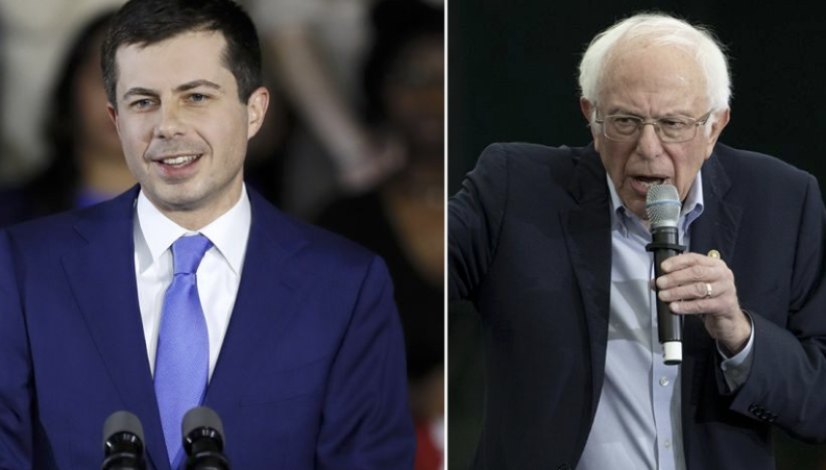Iowa’s real winners and losers (hint: it’s not who you think)

Iowa Democratic officials continue to release partial data on the outcome of the Iowa caucuses. What we know so far is that, with 71 percent of the precincts reporting, Pete Buttigieg leads in delegates (27 percent) but Bernie Sanders is close behind with 25 percent, despite winning the most votes. Elizabeth Warren has 18 percent of the delegates, Joe Biden has captured 16 percent, and Amy Klobuchar trails with only 13 percent. It is still not clear when the final results will become available.
The Iowa contest was a disaster for Democrats in every possible way. The chaos on Tuesday night and inability to deliver results in a timely fashion was an utter embarrassment, reflecting poorly on party officials and causing much taunting by Republicans. But the outcome was also an unhappy one for Democrats.
Joe Biden, considered by many the candidate most likely to win against Donald Trump, came in a humiliating fourth, despite piling resources into Iowa in a last-ditch effort to boost his fortunes there.
Pete Buttigieg looks to have snagged the most delegates, giving his campaign some heft, but many are skeptical that the former small-city mayor is up to competing on the national stage. Moreover, they note he polls poorly in South Carolina, indicating that he still lags rivals in attracting black voters, a key Democratic constituency.
In short, the first-in-the-nation vote in the Democratic primary was a mess and could lead to ongoing infighting between Sanders’ fired-up army and the Democratic Party machine.
The day after the Iowa caucuses the Sanders camp insisted they won the night, with senior adviser Jeff Weaver saying on MSNBC that internal campaign data showed him leading the final count with 29.66 percent of the state’s delegates.
Any indication – any at all – that the Iowa contest was not fair, or that party officials are trying to box out Sanders as the primary contest rolls forward — will heighten the possibility that the Vermont senator’s devoted followers will sit out the election, as many did in 2016. They could, quite easily, reelect Donald Trump.
Even with the still-incomplete results, there are some obvious winners and losers from the Iowa caucuses.
The biggest losers are the winners, Bernie Sanders and Pete Buttigieg. Both missed an important opportunity to capitalize on that achievement by giving a nationwide victory speech. (Although both candidates gave versions of victory speeches on Monday night it wasn’t the same as the real thing, based on real results.)
In 2008, when Barack Obama placed first in the caucuses, topping Hillary Clinton and John Edwards, he addressed a prime time audience of tens of millions, celebrating his win.
He showed the country what Iowa voters had discovered: Obama was a star. He established himself as a credible candidate, gaining not only recognition but all-important momentum.
Because of the unimaginable SNAFU this time round, Sanders and Buttigieg both missed that opportunity.
In the case of Sanders, he might have at last convinced the nation that he could expand beyond his enthusiastic “army” to attract a broad swath of voters.
Buttigieg, for his part, could have used the moment to persuade moderates that he was a better bet than Joe Biden or Amy Klobuchar.
The second loser for sure is the flailing Democratic Party. Not only will they have to quell rumblings among Sanders’ army, they also recorded tepid turnout. Based on what we saw in Iowa, it may be that the GOP has an enthusiasm advantage.
Buttigieg is also a loser for having stepped on his own success. His mistake was giving a rousing speech in which he claimed victory, before any results were posted and even though there was no evidence that he had actually won. #MayorCheat trended for hours on Twitter, as many plied conspiracy theories about the various ways the Buttigieg campaign might have orchestrated the caucus collapse.
Much attention focused on the app that failed and Shadow, the software company that created it. Some suspected that the Buttigieg camp was complicit in the meltdown since the campaign had spent “tens of thousands of dollars” with Shadow, according to Federal Election Commission’s data.
That appears absurd, but as tempers frayed and everyone searched for a culprit, Mayor Pete took a beating on social media.
Buttigieg will recover, and many will write it off as a rookie error, but in a hard-fought campaign where many question his inexperience and small-town accomplishments, it was an unnecessary self-inflicted wound.
There are three definite winners from the Iowa meltdown. The first is Joe Biden, who appears to have come in an unimpressive fourth, but who sailed off to New Hampshire without any damage done by that poor showing. The news blackout was a blessing to the struggling former vice president; if a tree falls in the forest…
The most important winner is billionaire and former New York City Mayor Mike Bloomberg. Voters are likely to conclude that none of the candidates participating in the Iowa caucuses can come close to beating Donald Trump. That opens the door to Bloomberg who, armed with his billions, has been waiting to make his case. It just becomes a lot easier.
The biggest winner out of Iowa, of course, was President Trump, who garnered record turnout among Republicans voting for an incumbent and who walked away with over 97 percent of the vote.
He had flooded the state with surrogates, making it all but impossible for rival wannabes Joe Walsh or Bill Weld to gain any traction. It was a show of strength and a smart move, and all the more impressive given the utter calamity that beset Democrats.
Published on Foxnews.com




